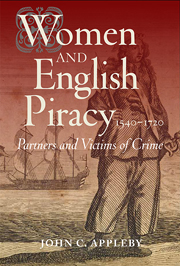Book contents
- Frontmatter
- Contents
- Maps and Illustrations
- Acknowledgements
- A Note on Conventions
- Abbreviations
- Introduction
- 1 The Rise and Fall of English Piracy from the 1540s to the 1720s
- 2 Pirates, Female Receivers and Partners: The Discrete Supporters of Maritime Plunder from the 1540s to the 1640s
- 3 Wives, Partners and Prostitutes: Women and Long-Distance Piracy from the 1640s to the 1720s
- 4 Petitioners and Victims: Women's Experiences from the 1620s to the 1720s
- 5 The Women Pirates: Fact or Fiction?
- Epilogue
- Bibliography
- Index
Epilogue
Published online by Cambridge University Press: 05 October 2013
- Frontmatter
- Contents
- Maps and Illustrations
- Acknowledgements
- A Note on Conventions
- Abbreviations
- Introduction
- 1 The Rise and Fall of English Piracy from the 1540s to the 1720s
- 2 Pirates, Female Receivers and Partners: The Discrete Supporters of Maritime Plunder from the 1540s to the 1640s
- 3 Wives, Partners and Prostitutes: Women and Long-Distance Piracy from the 1640s to the 1720s
- 4 Petitioners and Victims: Women's Experiences from the 1620s to the 1720s
- 5 The Women Pirates: Fact or Fiction?
- Epilogue
- Bibliography
- Index
Summary
England played a leading role in promoting and maintaining seaborne plunder of varied forms from the 1540s to the 1720s. Building on medieval tradition, piracy and privateering flourished within the local waters of the British Isles. Its expansion overseas initiated a process of predatory globalization which led English adventurers to prey on shipping across the oceans and seas of the world. Adapting to local conditions it was grafted on to corsair enterprise in the Mediterranean and merged with buccaneering in the Caribbean. It was a remarkably dynamic, but also fragmented, development. At times of intense activity thousands of male recruits were attracted into piracy. At least 1,000 rovers were operating during the later sixteenth and early seventeenth centuries. During the period from 1716 to 1726 between 1,000 and 2,000 pirates were active at any particular time; collectively as many as 5,000 were at sea across these years. After decades of cultural adaptation and improvisation, pirate groups had acquired a defiant, unrepentant lifestyle, appearing as a kind of social banditry. Their conduct, contradictory and chaotic, violent and abusive, cannot be easily explained by economics alone. Though driven by the quest for booty, pirate recruits also appeared to be in search of a lost world of reciprocity and mutuality at sea, which saw some groups masquerading as ‘Robbin Hoods Men’ during the 1720s. The retribution and punishment inflicted on some ship-masters was a direct result of changing maritime conditions and labour relations, as owners and merchants tried to raise productivity levels among the merchant marine. Such conditions were dramatized by shipboard politics, providing a breeding ground for discontent and mutinous behaviour which was increasingly linked with piracy.
- Type
- Chapter
- Information
- Women and English Piracy, 1540-1720Partners and Victims of Crime, pp. 225 - 230Publisher: Boydell & BrewerPrint publication year: 2013



